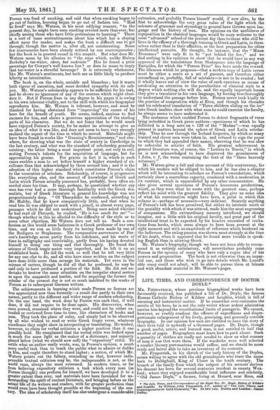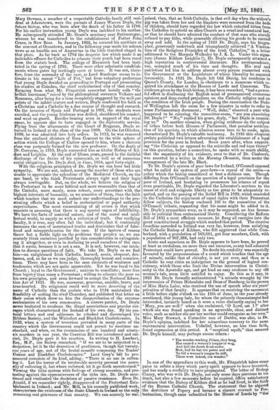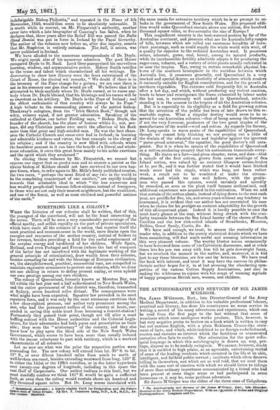LIFE, TIMES, AND CORRESPONDENCE OF DOCTOR DOYLE.*
MR. FITZPATRICK, whose previous biographical works have been favourably received, has published a life of Dr. Doyle, the famous Roman Catholic Bishop of Kildare and Leighlin, which is full of amusing and instructive matter. If he somewhat over-estimates the merits of his hero, he is not the only writer whose ardent admiration carries him beyond the constitutional limits of panegyric. We cannot, however, so readily condone the offence of superfluous and dispro- portionate enlargement of his lively, gossiping, and generally sensible biography. In our opinion few men are entitled to have the story of their lives told in upwards of a thousand pages. Dr. Doyle, though a good, useful, active, and learned man, is not entitled to half that number of pages. Biographers must learn how to pack closer. Such a quantity of clothes are really not needed to show us what manner of man it was that wore them. If the wardrobe were well selected a smaller literary portmanteau would suffice, and we should be more ready and better able to take an inventory of its contents. Mr. Fitzpatrick, in his sketch of the early history of the Doyles, seems willing to agree with the old genealogists who trace the name back to Dubbghaill, King of Ulster in the tenth century. The branch of the family from which the subject of his memoir derives his descent has been for several centuries resident in county Wex- ford; where they enjoyed considerable local influence and celebrity. " Old James Doyle," a farmer, living at Donard, near Ross, and • The Life, Times, and Correspondence of the Right Rev. Dr. Doyle, Bishop of Kildare and Leighlin By William John Fitzpatrick, J.P., author of " The Life, Times, and Contemporaries of Lord Cloncurry," &c. In two vols. Dublin and London : James Duffey. Mary Downes, a member of a respectable Catholic family still resi' dent at Adamstown, were the parents of James Warren Doyle, the future bishop, who was born after the death of his father in 1786. For his earlier instruction young Doyle was indebted to his mother, He subsequently attended Mr. Grace's seminary near Rathnorogue, whence he was transferred to the establishment of Father John Crane, in New Ross. In January, 1805, he entered his novitiate at the convent at Granstown, and in the following year made his solemn vows as an humble son of Augustine in the little thatched chapel in that place. As far back as 1782 the despotic law which made it an indictable offence for Catholics to educate their youth had been rased from the statute book. The college of Maynooth had been insti- tuted in the spring of 1795. There were other scholastic establish- ments whose gates lay invitingly open at home. It was not, there- fore, from the necessity of the case, as Lord Stanhope seems to in- timate in his recent "Life of Pitt," but from voluntary preference that young Doyle decided on proceeding to Portugal and prosecuting his studies at Coimbra, the chief ecclesiastical city of that country. Escaping from what Mr. Fitzpatrick somewhat noisily calls " the hellish hurricane," raised by the philosophical sorcerers Voltaire and Rousseau, after being for a time completely staggered by the well-put points of the infidel orators and writers, Doyle confirmed his faith as a Christian and a Catholic by a due course of thought and research. On the invasion of Spain and Portugal in 1807, the students were enrolled, and the young Irishman was drilled, shouldered his musket, and went on guard. Besides bearing arms in support of the royal cause, he appears also to have engaged in the diplomatic service. Flying from the allurements of the Court of Braganza, Doyle re- turned to Ireland at the close of the year 1808. On the 1st October, 1809, he was admitted into holy orders. In 1813, he was removed from the confined cloisters of Ross Convent to the wide sphere of action which the College of Carlow opened to him, where a rhetoric class was purposely formed for the new professor. On the death of Dr. Corcoran, in 1819, Doyle succeeded him as titular Bishop of K2- dare and Leighlin. At the end of fifteen years, passed in the faithful discharge of the duties of his episcopate, as well as of numerous social obligations, Dr. Doyle died, in June, 1834, aged forty-eight. With the religions principles of Dr. Doyle we can have but little sympathy. We are not, indeed, among the number of those who are unable to appreciate the splendour of the Mediaeval Church, on the one hand, or who think Protestants always right and their logic always irrefragable. But, on the whole, we believe the religion of the Protestant to be more biblical and more reasonable than that of the Catholic, more manly, more robust, more accordant with the highest interests of humanity, as we conceive of them, than the faith which teaches that we must submit our understandings to the pro- strating effects which a belief in ecclesiastical or papal authority saperincluces. The most emasculating of all errors is that which consists in assuming that there is any special organ of infallibility. We have the facts of material nature, and of the moral and intel- lectual world, to supply us with a criterion of truth. Our verifying faculty, it is true, may often fail the individual; but it continually increases the sum of ascertained truths and diminishes that of false- hood and misapprehension for the race. If the lantern of reason throw but a feeble light on the problems that perplex us, we can scarcely think ourselves justified by this consideration in extinguish- ing it altogether, or even in declining to avail ourselves of the rays that it emits, because it is not a sun. It is not, however, our inten- tion to discuss questions of faith. We take Dr. Doyle as we find him—an enlightened Irish Catholic, learned, acute, eloquent, dex- terous, and, so far as we can judge, thoroughly honest and conscien- tious. There may have been in the man elements of weakness and tendencies which are not quite approvable. Yet he was loyal to his Church ; loyal to the Government; anxious to conciliate; more free from bigotry than many a Protestant ; willing to educate the poor on his own principles, and even forward to accept the National Educa- tion Act of 1831. He was, moreover, generous, amiable, brave, and true-hearted. No religionist could well be more deserving of the krne of Catholic than the prelate who in 1824 maintained the feasibility of uniting the rival Churches, and published that letter on their union which drew on him the disapprobation of the extreme ecclesiastics of his own communion. A sincere patriot, Dr. Doyle never hesitated to condemn the illegal associations and popular out- rages which characterized the Ireland of his own day. By his pas- toral letters and oral addresses he rebuked and discouraged the Ribbon Society, and the Whitefeet and Blackfeet Confederacies. In 1833, when a system of terrorism prevailed in many parts of the country which the Government could not permit to continue un- checked, and when, on the commission of one hundred and ninety- six murders in one year, the Coercion Bill was introduced and car- ried, Dr. Doyle gave it his sanction. In writing to H. Lambert, Esq., M.P., the bishop remarked, "If we are to be subjected to a despotism, let it be the despotism of gentlemen, though but twenty- one years of age, not of the brutal canaille composing the Trades' unions and Blackfeet Confederacies." Lord Grey's bill he pro- nounced complete of its kind, adding: "There is no use in soften- ing it. Let the terror of its intolerable severity prevent the neces- sity of enforcing it, but where enforced, let it go forth unrestrained." Viewing the tithe system with feelings of strong aversion, and pro- testing against the oppressiveness of the tithe law, Dr. Doyle sanc- tioned and vindicated the doctrines of passive resistance. Even Dr. Arnold, if we remember rightly, disapproved of the Protestant Esta- blishment in Ireland.; and Mr. Mill, in his recently published work, characterizes the existence of the State Church in Ireland as the only remaining real grievance of that country. We can scarcely be- sale
prised, then, that an Irish Catholic, in that evil day when the widow's pig was taken from her and the blankets were removed from the beds of children, should have regarded the law which extorted tithes from
the Catholics to uphold an alien Church as a cruel and unnatural law, or that he should have admired the conduct of that man who sternly
refused to pay tithe, while peaceably allowing his goods to be carried away and sold. In the spring of 1823 Dr. Doyle, says his biogra- pher, generously undertook and triumphantly achieved "A Vindica- tion of the Rawoils Principles of the Irish Catholics," in a letter addressed to the Marquis Wellesley by J. K. L. Under this signa- ture. (James Kildare Leighlin ?), Dr. Doyle subsequently attained a high reputation in controversial literature. His correspondence, too, occupied much of his time and thoughts. His zeal and patriotism led. him to address almost every person connected with the Government or the Legislature of whose liberality he augured favourably. In 1825 Dr. Doyle left Old Derrig, his residence in Queen's County, for London, in obedience to a summons which re- quired his attendance at the Houses of Lords and Commons. The evidence given by the Irish bishop, it has been remarked, "had a power- ful effect in disabusing the English mind of preconceived erroneous
opinions and deep-rooted prejudices on the Catholic religion and on the condition of the Irish people. During the examination the Duke of Wellington left the room for a few minutes in order to refer to some Parliamentary document; "Well, duke," observed a peer whh happened to be entering. the committee-room, "are you examining Dr. Doyle? "No," replied his grace, dryly, "but Doyle is examin- ing us." On another occasion, when giving evidence on the subject of tithes before both Houses of Parliament, that peculiar anticipa- tion of his querists, to which allusion seems here to be made, again characterized Dr. Doyle's valuable testimony. In 1825 this eloquent prelate published two letters advocating the establishment of a legal provision for the poor in Ireland. Some years after, when support- ing "the Christian as opposed to the scientific and red tape theory" on this question, before a committee, he spoke with so much ability, that the superiority of his evidence, even to that of Dr. Chalmers, was asserted by a writer in the Morning Chronicle, then under the management of the late Mr. Black.
To Dr. Doyle's system of poor laws forlreland, O'Connell opposed what he called his system of poor-laws—a repeal of the union—a policy. which the bishop considered at best a dubious one. Though differing from O'Connell on the question of a legal provision for the poor of Ireland, and hesitating to pronounce his scheme of repeal even practicable, Dr. Doyle regarded the Liberator's services to the cause of civil and religions liberty as too great to be adequately re- quited, and on the passing, of the Relief Bill in 1829, which conceded to the Catholics the enjoyment of equal rights with their Protestant fellow subjects, the bishop enclosed 10/: to the committee of the O'Connell tribute, requesting that his name might be added to it. Dr. Doyle's sympathies were, as it may be supposed, no less favour- able to political than ecclesiastical liberty. Considering the Reform Bill of 1831 a most efficient measure, he flung all energies into the 'great constitutional struggle which marked that period. The elective franchise accorded to Ireland was very far, however, from satisfying the Catholic Bishop of Kildare, who felt aggrieved that while Cum- berland, with a population of 169,681, got four members, Cork, with a population of 807,366, had only two. Acute and sagacious as Dr. Doyle appears to have been, he proved at least as credulous, on more than one occasion, as any half-educated Protestant could have proved. No doubt his credulity was especially favoured by the prepossessions of a creed which teaches that the age of miracle, unlike that of chivalry, is not yet over, and thus as a Catholic he may claim an indulgence on the ground of logical con- sistency, which those who limit the Divine intervention in Christi- anity to the Apostolic age, and 4et lend an easy credence to any old woman's tale, seem little entitled to enjoy. Be this as it may, in 1823 Dr. Doyle formally authenticated. "a miracle wrought by the intercession of Prince Hohenlohe and Dean of Bamberg, in the person of Miss Maria Lalor, who received the use of speech after six year? privation of that faculty. It appears that on receiving the sacrament a little before eight o'clock on the 11th of June, in the year already mentioned, this young lady, for whom the princely thaumaturgist had interceded, instantly heard as it were a voice distinctly saying to her Mary, you are well !' when she exclaimed, ` 0 Lord, am I ?' after which she was found speaking in an agreeable, clear, and distinct voice, such as neither she nor her mother could recognize as her own." Miss Mary Stewart, a Carmelite nun of Dublin, was also, in Dr. Doyle's opinion, indebted for her miraculous recovery to the same supernatural intervention. Unbelief, however, no less than faith, found expression at this period. A " sceptical squib," that amused Dr. Doyle himself, may perhaps amuse others : " The wonder-working Prince, they brag, Has caused a woman's tongue to wag, And laid the dumb fiend under. Now, had he but the power and will To bid a woman's tongue lie still,. There was indeed., the wonder."
In one of the appendices to this work, Mr. Fitzpatrick takes some pains to refute a story which party spirit appears to have invented, and too ready a credulity to have propagated. The letter of Bishop Clancy, who was with Dr. Doyle, not only some days previous to his death, but also a few momeiks before he expired, offers satisfactory evidence that the Bishop of Kildare died as he had lived, in the faith of the Roman Catholic Church. The statement that he abjured the doctrines of Popery and became a sincere convert to Pro-, testantism, though once submitted to the House of Lords by "the indefatigable Bishop Philpotts," and repeated in the Times of 5th November, 1540, would thus seem to be absolutely untenable. It is worth while to correct, on Mr. Fitzpatrick's authority, another error into which a late biographer of Canning's has fallen, when he declares that, three years after the Relief Bill was passed the Bulla macs Domini was put in force in Ireland by the Papal hierarchy. The author of the volumes now before us, after due inquiry, asserts that Mr. Stapleton is entirely mistaken. The,bull, it seems, was never published in Ireland.
We have alluded to the numerous correspondents of Dr. Doyle. We might speak also of his numerous admirers. The poet Moore compared Doyle to St. BasiL Lord Grey panegyrized his marvellous learning, wisdom, and argumentative power. Sidney Smith testifies to the sense and talent which characterized all his writings. En- deavouring to show how illusory were the fears entertained of the Court of Rome, the clerical wit remarks, " We doubt if there is in the treasury of the Pope change for a guinea; we are sure there is not in his armoury one gun that would go off. We believe that if he attempted to bless anybody whom Dr. Doyle cursed, or to curse any- body whom Dr. Doyle blessed, that his blessings and his curses will be as impotent as his artillery. Dr. Doyle is the Pope of Ireland ; and the ablest ecclesiastic of that country will always be its Pope." A high tribute to the commanding powers of the patriot bishop. Thackeray's eulogium, from the " Irish Sketch Book," though not witty, evinces equal, if not greater admiration. Speaking of the cathedral at Carlow, our better Fielding says, " Bishop Doyle, the founder of the church, has the place of honour within it ; nor, per- haps, did any Christian pastor ever merit the affection of his flock more than that great and high-minded man. He was the best cham- • pion the Catholic Church and cause ever had in Ireland; in learning and admirable kindness and virtue, the best example to the clergy of his religion ; and if the country is now filled with schools, where the humblest peasant in it can have the benefit of a liberal and whole- some education, it owes this great boon mainly to his noble exertions and the spirit which they awakened." On closing these volumes by Mr. Fitzpatrick, we cannot but express our regret that so good a man and so sincere a patriot as the titular bishop of Kildare should not have survived to our own hap- pier times, when, to refer again to Mr. Mills's lately published treatise, the two races, " perhaps the most fitted of any two in the world to be the completing counterpart of one another," are rapidly tending towards that attainable ideal in which " the less numerous and less wealthy people shall become fellow-citizens instead of foreigners, to those who are not only their nearest neighbours, but the wealthiest, and one of the freest, as well as most civilized and powerful nations of the earth."
































 Previous page
Previous page